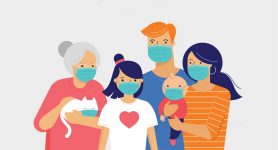 ATLANTA, GA-Some family members may still need to take steps to protect themselves against COVID-19, such as children too young to get vaccinated or people with weakened immune systems. Any family member who is not fully vaccinated should keep taking steps to protect themselves and others. In general, people are considered fully vaccinated:
ATLANTA, GA-Some family members may still need to take steps to protect themselves against COVID-19, such as children too young to get vaccinated or people with weakened immune systems. Any family member who is not fully vaccinated should keep taking steps to protect themselves and others. In general, people are considered fully vaccinated:
- 2 weeks after their second dose in a 2-dose series, such as the Pfizer or Moderna vaccines, or
- 2 weeks after a single-dose vaccine, such as Johnson & Johnson’s Janssen vaccine
If you are not fully vaccinated and aged 2 or older, you should wear a mask in indoor public places. In general, you do not need to wear a mask in outdoor settings. In areas with high numbers of COVID-19 cases, consider wearing a mask in crowded outdoor settings and for activities with close contact with others who are not fully vaccinated. People who have a condition or are taking medications that weaken their immune system may NOT be protected even if they are fully vaccinated. They should continue to take all precautions recommended for unvaccinated people, including wearing a well-fitted mask, until advised otherwise by their healthcare provider.
How can I protect my unvaccinated child?

These are the best ways to protect your child, or a child you care for, who cannot get vaccinated yet:
- Get vaccinated yourself. COVID-19 vaccines reduce the risk of people getting and spreading COVID-19.
- If your child is 2 years and older, make sure that your child wears a mask in public settings and takes other actions to protect themselves.
- To set an example, you also might choose to wear a mask.
- If your child is younger than 2 years or cannot wear a mask, limit visits with people who are not vaccinated or whose vaccination status is unknown and keep distance between your child and other people in public.
How do I protect a family member with a weakened immune system?
- Get vaccinated yourself. COVID-19 vaccines reduce the risk of people getting and spreading COVID-19.
- People who have a condition or are taking medications that weaken their immune system may NOT be protected even if they are fully vaccinated. They should continue to take all precautions recommended for unvaccinated people, including wearing a well-fitted mask, until advised otherwise by their healthcare provider.
My family members aren’t vaccinated. How do I protect them?
- Get vaccinated yourself. COVID-19 vaccines reduce the risk of people getting and spreading COVID-19.
- Any family member who is not fully vaccinated should keep taking steps to protect themselves and others, like wearing a well-fitted mask and staying 6 feet from others in public.
Are some activities safer than others?
- If you are not fully vaccinated and aged 2 or older, you should wear a mask in indoor public places.
- In general, you do not need to wear a mask in outdoor settings.
- In areas with high numbers of COVID-19 cases, consider wearing a mask in crowded outdoor settings and for activities with close contact with others who are not fully vaccinated.
- People who have a condition or are taking medications that weaken their immune system may NOT be protected even if they are fully vaccinated. They should continue to take all precautions recommended for unvaccinated people, including wearing a well-fitted mask, until advised otherwise by their healthcare provider.
- If you are fully vaccinated, see When You’ve Been Fully Vaccinated.
Media Release/Centers for Disease Control and Prevention


